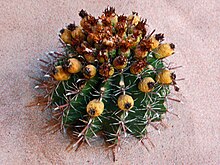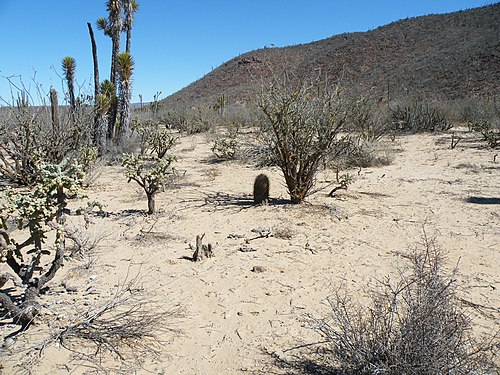| Ferocactus peninsulae | |
|---|---|

| |
| Conservation status | |
 Least Concern (IUCN 3.1) | |
| Scientific classification | |
| Kingdom: | Plantae |
| Clade: | Tracheophytes |
| Clade: | Angiosperms |
| Clade: | Eudicots |
| Order: | Caryophyllales |
| Family: | Cactaceae |
| Subfamily: | Cactoideae |
| Genus: | Ferocactus |
| Species: | F. peninsulae |
| Binomial name | |
| Ferocactus peninsulae (F.A.C.Weber) Britton & Rose, 1922 | |
| Synonyms | |
| |
Ferocactus peninsulae is a barrel cactus in the genus Ferocactus of the family Cactaceae.
Description
Ferocactus peninsulae reaches a height of about 70 centimetres (28 in), rarely 2.5 meters, with a diameter of 40 centimetres (16 in). This plant is oval to club-shaped and has 12 to 20 showy, deep ribs. The thorns are grayish-red and have a yellowish or whitish tip. The central spines are banded and 4 to 15 centimeters long with the lowest central spine is flattened and curved in a hook shape and the 6 to 13 different, radial spines are slender occasionally twisted and bristle-like. The funnel-shaped flowers are red to yellow and reach a length of 5–6 centimetres (2.0–2.4 in). The fruits are spherical, yellow, up to 4.5 centimetres (1.8 in) long.
-
 Plants of Ferocactus peninsulae
Plants of Ferocactus peninsulae
-
 Flowers of 'Ferocactus peninsulae
Flowers of 'Ferocactus peninsulae
-
 Flower of Ferocactus peninsulae
Flower of Ferocactus peninsulae
-
 Thorns of Ferocactus peninsulae
Thorns of Ferocactus peninsulae
Distribution
Ferocactus peninsulae is found in the Mexican state of Baja California Sur growing on sandy hillsides at an elevation of 0 to 450 meters. Plants grow in association with Mammillaria dioica, Cochemiea setispina, Echinocereus ferreirianus and Lophocereus schottii
Taxonomy
In 1896, Frédéric Albert Constantin Weber first described this species as Echinocactus peninsulae. The name "peninsulae" originates from Latin, meaning "peninsula," in reference to the species' presence on the Baja California peninsula. Nathaniel Lord Britton and Joseph Nelson Rose transferred the species to the genus Ferocactus in 1922.
References
- Biología, Héctor Hernández (Instituto de; Group), Succulent Plants Specialist (2012-02-06). "The IUCN Red List of Threatened Species". IUCN Red List of Threatened Species. Retrieved 2024-01-22.
- N. L. Britton; J. N. Rose (1922), The Cactaceae. Descriptions and Illustrations of Plants of the Cactus Family (in German), vol. Band III, Washington: The Carnegie Institution of Washington, p. 133
- "Ferocactus peninsulae". LLIFLE. 2013-08-04. Retrieved 2024-01-22.
- D&Amp, Um National; (France), histoire naturelle (1895). Bulletin du Muséum d'histoire naturelle. Vol. t.1 1895. Impr. nationale. ISSN 0027-4070. Retrieved 2024-01-22.
- Britton, Nathaniel Lord; Eaton, Mary E.; Rose, J. N.; Wood, Helen Adelaide (1919). The Cactaceae : descriptions and illustrations of plants of the cactus family. Washington: Carnegie Institution of Washington. doi:10.5962/bhl.title.46288.
External links
 Media related to Ferocactus peninsulae at Wikimedia Commons
Media related to Ferocactus peninsulae at Wikimedia Commons Data related to Ferocactus peninsulae at Wikispecies
Data related to Ferocactus peninsulae at Wikispecies- Biolib.cz: Ferocactus peninsulae
| Taxon identifiers | |
|---|---|
| Ferocactus peninsulae |
|
| Echinocactus peninsulae | |

